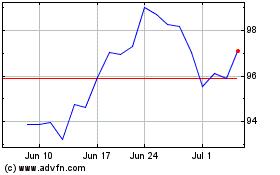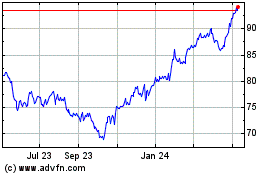At least three high-grade issuers tapped the U.S. credit markets
Thursday to secure cheap financing on sizable deals for the
long-term.
McDonald's Corp. (MCD) showed the timing to issue debt could be
hardly be better as it attained a record-low rate on a 30-year bond
as part of its two-part $750 million bond sale.
Meantime, U.S. Treasury prices tilted higher after a drowsy
session near the flatline as investors await the highly anticipated
monthly U.S. nonfarm payrolls report. The release, due Friday
morning, will shed light on any progress made last month in the
U.S. labor market, which appears to have been on a path of slow and
steady improvement.
Mortgage-backed securities prices outpaced Treasurys as
investors speculated that a White House effort to make refinancing
available to millions more borrowers would have limited
success.
Treasurys
With the unemployment report around the corner, Treasury traders
braced for a less robust reading than the upbeat surprises offered
by the last two reports, analysts said.
"Investors are waiting for it to offer some near-term guidance,"
though the market impact hasn't been lasting, said Kevin Flanagan,
chief interest-rate strategist at Morgan Stanley Smith Barney.
Flanagan said this is because market participants continue to
have broader, longer-term concerns about what is happening in
Europe. The current hot spot is Greece, as its government continues
to thrash out a deal with its private creditors. The parties were
said to have been on the verge of an agreement numerous times over
the past week, but talks go on.
Janney Montgomery chief interest-rate strategist Guy LeBas said
a deal has been "impossibly slow to emerge." And despite uplifting
comments early Thursday from Chinese Premier Wen Jiabao that China
is considering lending deeper support for Europe's bailout fund,
Eurogroup president Jean-Claude Juncker damped the mood by calling
Greece's debt talks "ultra-difficult."
With Greece dealing in limbo and a key U.S. economic reading
just ahead, Treasurys were left drifting between slim gains and
losses for much of the session. It took some bond-friendly remarks
from Federal Reserve speakers to edge the market higher.
In late-afternoon trading, benchmark 10-year notes gained 5/32
to yield 1.826%. The 30-year bond rose 1/32 to yield 3.015%.
Two-year notes remained well-cemented around its 0.226% yield. Debt
prices move inversely to yields.
Investment-Grade Corporates
McDonald's sold $500 million of 3.70% coupon bonds at a yield of
3.78%, or 80 basis points over the Treasury rate.
That coupon beat the previous record by a clean 40 basis points,
according to data provider Dealogic, which says the lowest
dollar-denominated 30-year bond deal was attained by Alabama Power
Co. last month, at 4.10%.
Bank of America Corp. (BAC) sold a $2.25 billion, two-part bond
sale featuring 30-year bonds and a reopening of 10-year notes due
2022.
It sold $750 million of 2022 bonds at 5.076%, for a spread of
325 basis points over Treasurys, and $1.5 billion of 30-year bonds
at 5.952%, or 297 basis points over Treasurys.
Meantime, Brazilian cement company Votorantim Cimentos enlarged
the size of a 30-year deal first issued last April. It added $500
million to the outstanding debt, pricing the reopening to yield
7.30%, or 432.2 basis points over the Treasury rate.
The three high-grade deal follow a burst of issuance Wednesday,
when more than $16 billion of volume hit the market and broke
record-low coupons on three tenors.
Procter & Gamble Co. (PG) issued $1 billion of 10-year bonds
Wednesday at a record-low 2.30%, a full 15 basis points lower than
the prior record set by Colgate-Palmolive Co. (CL) in November,
according to Dealogic.
International Business Machines (IBM) also attained record-low
coupons for three- and five-year debt as it priced $2.5 billion at
coupons of 0.55% and 1.25%, respectively. Both records were also
held by Colgate.
The hunt for cheap financing brought weekly volume to a
much-higher-than-anticipated $21.98 billion, Dealogic said on
Wednesday. With the three new deals today, that figure should now
jump to $25.48 billion, rivaling the $28.87 billion sold in the
second week of January--the busiest week of 2012.
"Anywhere there is yield to pick up, people are in there buying
it--banks are having no problem placing these bonds," said Prasad
Kadiyala, managing director at First Principles Capital Management,
earlier this week.
Barclays Capital's (BCS) financial institutions index finished
Wednesday at 3.88%, or 68 basis points lower than at the end of
last year. Its spread to Treasurys Tuesday was 329 basis
points--the lowest since Nov. 16.
J.P Morgan's (JPM) broad CEMBI index, a key measure of
dollar-denominated emerging market corporate bond yields, fell to
5.84% Wednesday, a 44 basis point drop from the end of last year.
Its spread over Treasurys was 429 basis points--the lowest since
Nov. 8, 2011.
The rally continued Thursday, with Markit's CDX North America
Investment-Grade Index, a measure of health in the U.S.
corporate-bond market, on track to improved 1% as of 4:30pm. It now
stands at 99 basis points, the best level since early August.
Municipal Bonds
Prices of top-rated municipal bonds were largely higher
Thursday, as supply remained light and demand stayed strong.
According to a benchmark scale from Thomson Reuters Municipal
Market Data, yields on bonds across most of the curve were
unchanged to down as much as three basis points. Long-dated bonds,
in 2041 and 2042, performed best. Only debt maturing around 10
years, in 2020 through 2025, saw yields rise a basis point. Prices
and yields move inversely.
Activity was light Thursday as "there's nothing to trade," said
Dan Solender, director of municipal bond management at Lord Abbett.
Big deals this week have already been "put away," and there were no
deals of significant size.
Meanwhile, there's plenty of cash to be put to work, as
"portfolios around the country are seeing cash hit due to Feb. 1
coupon payments," said Miller Tabak Asset Management Chief
Executive Michael Pietronico. Billions of dollars in reinvestment
cash, coupled with sparse supply, also helped munis rally most of
January.
Still, some buyers were cautious ahead of Friday's jobs report
and amid the low-yield environment, said MMD analyst Domenic
Vonella. Benchmark muni bond yields are hovering at or around
record lows on MMD's scale, which it has kept since 1981.
Looking ahead, supply still appears "modest," Alan Schankel of
Janney Montgomery Scott wrote in a research note. Thirty-day
visible supply is $7.6 billion. To put that in perspective, an
average week last year saw just over $5 billion in issuance,
according to data provider Thomson Reuters.
Mortgages
Most Fannie Mae (FNMA), Freddie Mac (FMCC) and Ginnie Mae MBS
outperformed rising Treasury benchmarks by 1/32 to 2/32, after
accounting for the change in interest rates, as investors grew more
comfortable that the White House's push to refinance millions more
homeowners would have limited success.
President Barack Obama on Wednesday proposed changes that would
let more homeowners to take advantage of today's record low
interest-rates and expand federal programs to borrowers with
mortgages not funded through government entities Fannie Mae,
Freddie Mac and the FHA. Other proposed changes are meant to
increase borrower use of the federal Home Affordable Refinance
Program already in place.
Some aspects of the refinancing effort would require
Congressional approval, which analysts doubted given political
acrimony.
Still, investors weren't willing to make wholesale bets against
government success and gravitated to lower coupons that would be
less vulnerable to faster prepayments. Investors face risk of more
supply should refinancing jump but they also expect a third round
of quantitative easing--via MBS purchases--by the Federal Reserve
would offset that pressure.
"The Fed has been pretty clear that if QE3 were to happen
(purchases) would probably be in MBS, Franco Castagliuolo, a
portfolio manager at Fidelity Investments who helps oversee $65
billion in assets. "The Fed seems to be waiting in the wings to mop
up any supply impact."
Fannie Mae's 3.5% MBS rose 6/32 to 104-2/32, while its 5.5% MBS
gained about 1/32 to 108-27/32, according to Tradeweb.
-By Al Yoon, Dow Jones Newswires; 212-416-3216;
albert.yoon@dowjones.com
--Cynthia Lin, Patrick McGee and Kelly Nolan contributed to this
report.
Colgate Palmolive (NYSE:CL)
Historical Stock Chart
From Jun 2024 to Jul 2024

Colgate Palmolive (NYSE:CL)
Historical Stock Chart
From Jul 2023 to Jul 2024
